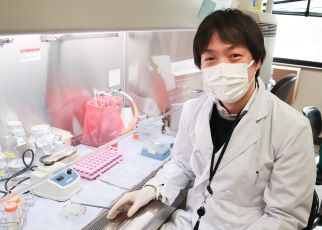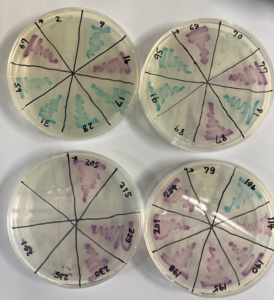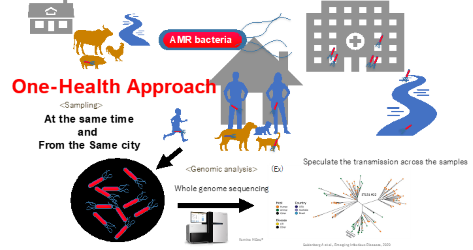- Home
- Social Action
- ★One Health Relay Report #33★
About "AMR bacteria"

Profile #33: Dr. SATO Toyotaka, Associate Professor
Laboratory of Veterinary Hygiene,
Department of Preventive Veterinary Medicine, Faculty of Veterinary Medicine
【Research Topics】
・Molecular epidemiology and mechanical analysis of antimicrobial resistance based on
One Health Approach
・Development of novel therapeutic approach against multidrug-resistant bacteria
~Aiming for “a world without AMR”~
Antimicrobial drug-resistant (AMR) bacteria are a major risk to our health. Some bacteria show "multidrug-resistant", which are ineffective against multiple antimicrobial agents. These antimicrobial drug-resistant bacteria are spreading to humans, animals, and the environment around the world, and it is estimated that 10 million people worldwide will die annually by 2050 if no measures are taken. Therefore, the World Health Organization and other countries are taking the lead in taking countermeasures against antimicrobial drug-resistant bacteria. However, the increase in the number of some resistant bacteria has been unstoppable.
We have analyzed the spread and establishment of resistant bacteria not only in human and animal hospitals, but also in healthy people and pets (dogs and cats) in the city and at home, and some of them are spread between them. Therefore, it is becoming more important to take AMR countermeasures based on the "One Health" approach. We are also conducting drug discovery to develop new therapeutic agents by finding substances that show antimicrobial activity only under specific conditions, such as at the site of infection. Based on this approach, we are working to contribute to the creation of a society in which people and animals do not suffer from AMR, aiming for “a world without AMR”.

Antimicrobial resistant bacteria grew on agar plates.

Analysis of antimicrobial resistant bacteria spreads in the community

Development of site-specific therapy against multidrug-resistant bacteria
